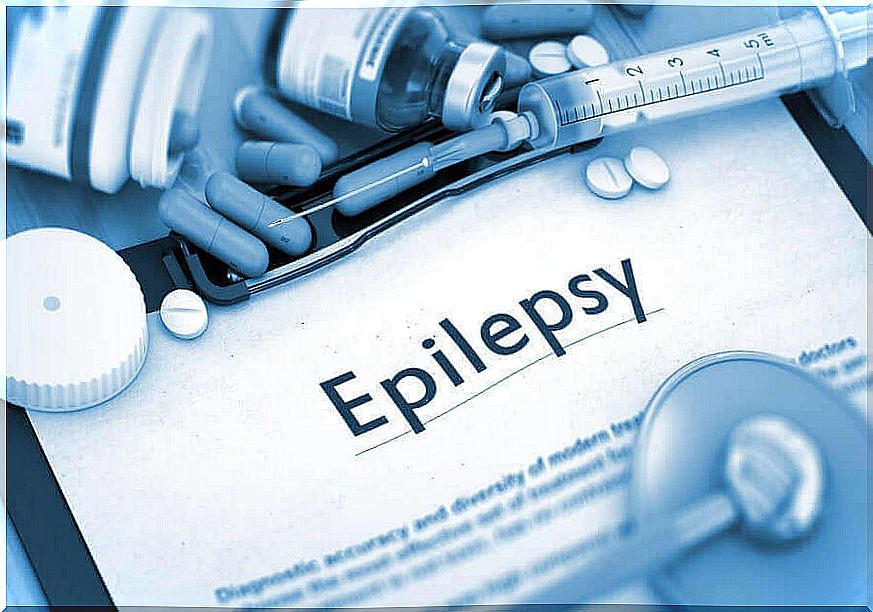Pregabalin: Drug Used To Treat Epilepsy

Pregabalin, like all medications on the market, can cause side effects. Of course, this should be taken into account if you are considering starting therapy with this drug. Talk to your doctor for more information.
Pregabalin is a medicine that is used to treat neuropathic pain and seizures. When doctors prescribe it as supportive care, it is able to reduce the number of partial seizures.
In today’s article, we will describe the main features of the diseases for which this drug is used. We will also look at the properties of the drug itself.
How does pregabalin work?

Pregabalin is a similar substance to the main inhibitory neurotransmitter of the central nervous system, GABA. GABA, like other neurotransmitters, is a chemical that we produce in our body. It transmits signals from one neuron to another.
Depending on whether it binds to one receptor or the other, this neurotransmitter will trigger one of the actions in our body. Activation of the GABA-A receptor, which is found in greater amounts in our brains, leads to a decrease in the activity of neurons. This would warrant an anticonvulsant effect
However, we don’t know how pregabalin works yet. All because we don’t know if it binds to GABA-A or GABA-B receptors. There are also no changes in the operation of GABA.
What diseases can pregabalin treat?
As we mentioned, pregabalin is used to treat neuropathic pain. We also use it in conjunction with other medications to treat epilepsy, especially for partial seizures.
Pregabalin and seizures
Pregabalin is one of the newest antiepileptic drugs to be introduced to treat partial epilepsy.
It appears that when this drug is given as adjunctive therapy, it may play a role in reducing the frequency of seizures. This is confirmed by a study published in 2008 by the journal Neuropsychiatric Disease and Treatment .
Find out more about epilepsy

Epilepsy occurs as a result of disturbances in the central nervous system. It occurs because our brain activity does not function normally. The brain produces electrical charges that trigger seizures.
Such seizures can be fatal if not treated properly or proper preventive measures are not followed.
The symptoms and the triggers vary from person to person. Moreover, this disease can affect any person. However, when a person develops one of the types of epilepsy, the next one is likely to be of the same type. It is worth remembering that there are exceptions to this rule and the symptoms may vary.
For a doctor to diagnose epilepsy, a patient must have at least two unprovoked seizures.
What is neuropathic pain?
Neuropathic pain affects approximately 7 to 10 percent of the population in Europe. Patients describe this pain as a choking and burning sensation. Sometimes they also feel a kind of tingling and throbbing in different parts of the body.
The pain occurs because the nervous system is not working properly. It occurs because of misinterpreted stimuli. This means that it produces pain from stimuli that shouldn’t be causing it.
This disease usually lengthens over time and occurs periodically. While it can occur spontaneously, there are situations that can trigger it. These include operations, infections or various injuries.
Pregabalin side effects

Pregabalin, like other drugs on the market, can cause side effects. They should always be considered before starting therapy.
Side effects are those unwanted and unintended effects that can occur while taking any medication. The most important side effects reported during clinical trials with this drug include:
- Dizziness.
- Lethargy.
- Mental disorders.
- Changes in the blood.
Pregabalin: a drug that is still under investigation
Pregabalin is mainly used to treat neuropathic pain and epilepsy. It is a substance similar to GABA, an inhibitory neurotransmitter in the central nervous system.
However, we still do not know exactly how this drug works. The reason for this is that it does not react with the receptors of the GABA neurotransmitter.
We recommend that you learn more about this medicine with the help of your doctor if you decide to take it. It is also worth finding out what its side effects are. Moreover, as with any other medication, you should only take it as prescribed by your doctor.









